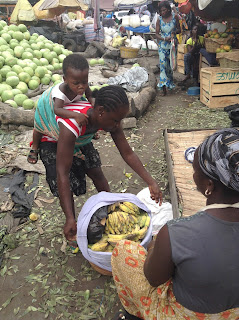A few days ago, I arrived in Accra for the first time and
was immediately struck by the intense heat and humidity. I’d been somewhat relieved
to miss the Harmattan winds but there was no way of dodging the scorching
temperatures. “How bad must things get by midday if I’m breaking out in a sweat
at 3am, just minutes after getting off the plane?” I wondered. We went through
immigration quickly, Kotoka Airport was almost as unremarkable as KKIA in
Lusaka. Ten minutes later, I was at my aunt’s home, my new home for the next
month and a half.
After a short but deep sleep and an ostrich steak lunch, my
next stop was Labadi Beach. From what I’d read before coming to Accra, this is
the city’s most popular beach and it’s often crowded on weekends. Luckily for
me, it was a Tuesday afternoon and I didn’t have to deal with the crowds. Coming
from landlocked Zambia, going to the beach was one of the main things I was
looking forward to in Ghana. I must admit, I was a little disappointed by the litter
and the touristy feel – I wasn’t expecting to find people selling Ghanaian art,
crafts and clothing, among other things. It’s hard to have a peaceful stroll on
the beach when faced with several people trying to get you to look at their
jewellery, painting and sculptures.
 |
| Hope was one of the vendors I met at Labadi Beach |
My hair attracted more attention than I wanted. Many sales
pitches started with “I like your rasta.” Even some vendors who didn’t try to sell
me anything called out stuff like “Jah rastafari” to me. And for some reason, a
few of them assumed I was American. One welcomed me and asked if I’d come from
New York. Saying that I was from Zambia got me responses such as “Africa is one. We’re united.” At least these guys were entertaining. Whatever
the case, I was happy to be back at a beach for the first time in years. And
the jewellery was surprisingly cheap, the vendors weren’t charging the
overinflated prices I expected for a beach next to a 5-star hotel. Alas, the
kwacha in my wallet was of no use.
 |
| My aunt, haggling |
 |
| "Rasta" girl in the ocean for the first time in years |
Day two was decidedly different. I headed out to central Accra
with Joyce, the lady my aunt hired to take care of her home. We took the trotro
(local minibus) to a local market. Trotros are a lot like minibuses in Zambia;
old, rundown and cramped with more people than they’re designed to carry. For a
second, I almost forgot I’d left home. Once we got to what Joyce called the
“real Accra” we walked through what has to be the biggest market I’ve ever been
to. We walked and walked and it felt we were never going to reach our
destination. It felt a long trek just for fruit, especially with the blazing
heat. I realized at some point this must be another place I read about, Makola
Market. We bought what felt like enough fruit to feed a family of four for a
month and then we left Makola and headed back to Airport Residential.
As we headed out of the market, several men on one street
started to call out to me but I ignored them. It turns out, this street was
some kind of money exchange black market and they were offering to exchange my
dollars for cedis. Apparently, these men had also assumed I was a foreigner.
Did I look like an uneasy foreigner, clearly not familiar with her environment
or are those men just really good at spotting foreigners under any circumstance?
Probably a bit of both.
Back at home I had my first plate of jollof rice. I’ve never
been to West Africa but I’m familiar with jollof wars, mostly between Ghanaians
and Nigerians. I’ve heard both Ghanaians and Nigerians not only argue about
which country makes the best jollof but also speak of well prepared jollof as
though it’s something that’ll change your life, a food-based spiritual
experience. I enjoyed it but unfortunately, my first plate of jollof did not
change my life and there was nothing transcendental about it. But hey, I have
plenty more time to try jollof again and many more Ghanaian foods.




